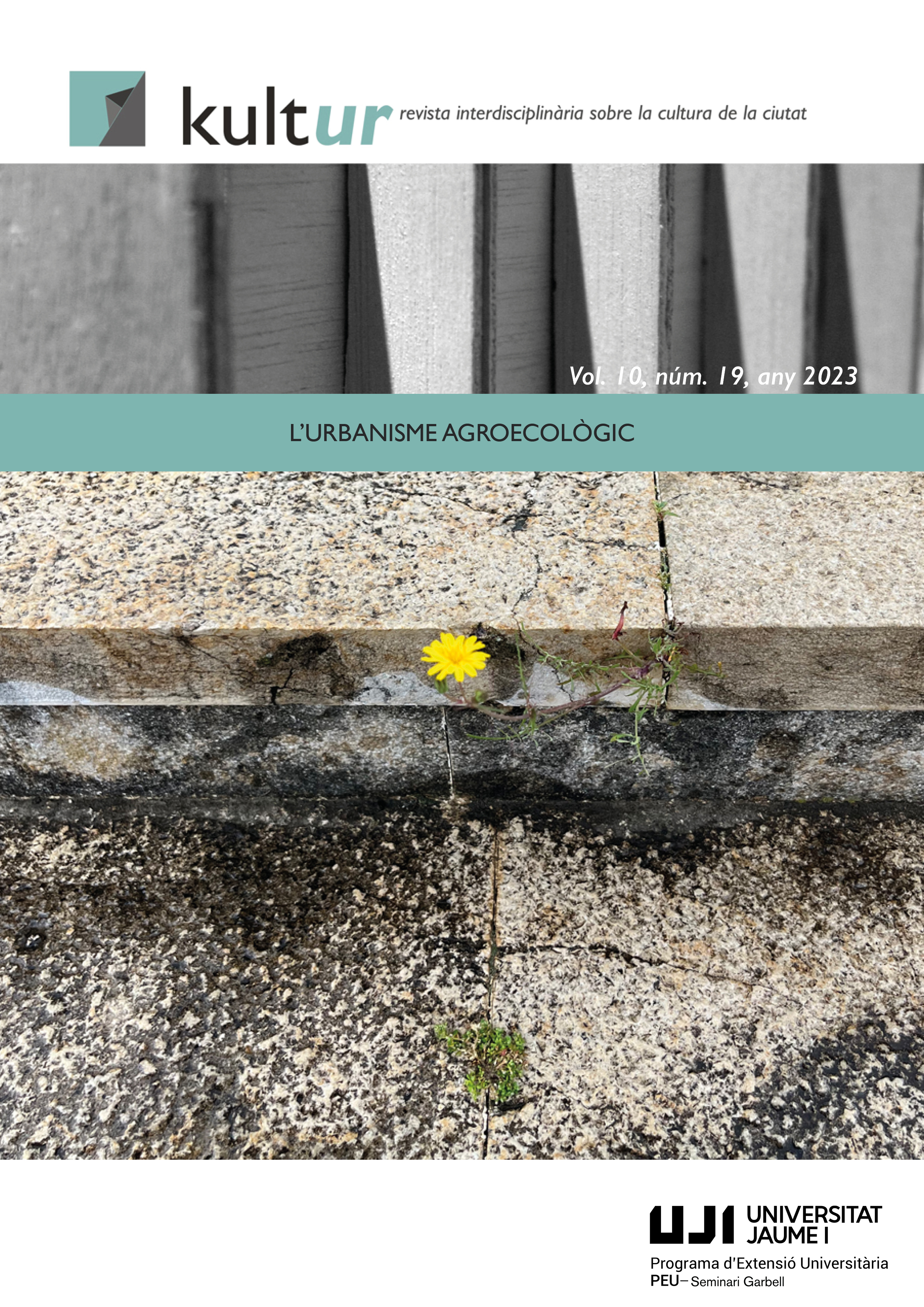El cuidado y la ciudadanía sostenible. ¿Una relación problemática? ¿UNA RELACIÓN PROBLEMÁTICA?
Main Article Content
Abstract
As part of a doctoral program, a participatory action research has been conducted to explore the possibilities offered by the notion of Quantum Satis, of pharmacology and food safety, to cultivate sustainable citizenship. For two years, students, teachers, non-teaching groups and families of a kindergarten and primary school in the Andorran Pyrenees, collaborated in the co-production of meanings that allow to outline a conceptual and operational framework for the learning of sustainable self-regulation of consumption. This article focuses on partial results of the study and shows that the research carried out problematizes the value of care and contributes to knowledge by describing a scale of meanings for this value. At one end of this scale is the value of systemic care that links care with the eco and interdependent nature of life. At the other extreme is the value of hedonistic care, which perpetuates predatory patterns of production and consumption. In the middle, the tension between a corrective and a proactive meaning of care. The key to cultivating sustainable citizenship is redefine school as a community of practice where people learn to take care of themselves by caring the socio-ecological space of which they are part.
Downloads
Article Details
All the contents of kult-ur journal are distributed under the Creative Commons Attribution-ShareAlike 4.0 International (CC BY-SA 4.0), unless otherwise indicated. Click to see basic information and the legal text of the license. The indication of this license CC BY-SA 4.0 must be expressly stated in this way when necessary.
References
Anderson, Gary y Herr, Kathryn (2009). “El docente-investigador: la investigación-acción como una forma válida de generación de conocimientos” en La investigación educativa: una herramienta de conocimiento y de acción, complilado por I. Sverdlick, 47-69. Madrid, CEP S.L.
Barbour, Rosalind S. (2014). “Quality of Data Analysis”, en The SAGE handbook of qualitative data analysis, editado por U. Flick, 496-509. Sage.
Barbour, Rosalind S. (2013). “Focus Group”. Keynote in IIQM-ATLAS.ti Qualitative Methods Webinar Series, April 16, 2013. https://www.youtube.com/watch?v=5xPYGXJ_hM4&list=PL8CTEdsSSmZEq7SnpRtBzUijqXaaeTUdF&index=32
Butlletí Official del Principat d’Andorra (BOPA) (2015). Decret d’ordenament de l’educació bàsica obligatòria del sistema educatiu andorrà. Govern d’Andorra.
Cadavid-Velásquez, Edith de Jesús, Pérez-Vásquez, Nabi del Socorro y Flórez-Nisperuza, Elvira Patricia (2021). “El valor del cuidado del ambiente potenciado desde el vínculo didáctico madre-Tierra en estudiantes de la educación media colombiana”. Entramado vol. 17 (2), 196-206 https://doi.org/10.18041/1900-3803/entramado.2.6093
Chevalier, Jacques M. y Buckles, Daniel J. (2011). Guía para la Investigación, la Evaluación y la Planificación Participativas. SAS2 Dialogue.
Comins Mingol, Irene (2008). La ética del cuidado y la construcción de la paz. Icaria.
Deci, Edward L. y Ryan, Richard M. (2008). “Hedonia, Eudaimonia, and well-being: An Introduction”. Journal of Happiness Studies (9), 1–11, https://doi.org/10.1007/s10902-006-9018-1
Díaz Barriga Arceo, Frida (2003). “Cognición situada y estrategias para el aprendizaje significativo”. REDIE. Revista Electrónica de Investigación Educativa, vol. 5 (2), 105-117. http://www.redalyc.org/articulo.oa?id=15550207
Dombayci Mehmet A., Demir Metin, Tarhan, Sinem y Bacanlı, Hasan (2009). “Quadruple Thinking: Caring Thinking”. Procedia Social and Behavioral Sciences (12), 552–561. https://doi:10.1016/j.sbspro.2011.02.067
Durán Rodríguez, Rafael (2009). “Aportes de Piaget a la educación: hacia una didáctica socio-constructivista”. Dimensión empresarial vol. 7 (2), 8 – 11. https://dialnet.unirioja.es/servlet/articulo?codigo=3990224
European Commission (2022). Communication from the Commission to the European Parliament, the Council, the European Economic and Social Committee and the Committee of the Regions on the European care strategy. Brussels, 7.9.2022. https://ec.europa.eu/social/BlobServlet?docId=26014&langId=en
Gallopín, Gilberto C. (2003). Sostenibilidad y desarrollo sostenible: un enfoque sistémico. Naciones Unidas. https://repositorio.cepal.org/handle/11362/5763
Herrero, Yayo (2012). “Propuestas Ecofeministas para un sistema cargado de deudas”. Revista de Economía Crítica, vol. (13), 30-54. https://revistaeconomiacritica.org/index.php/rec/article/view/521
Hernández Sampieri, Roberto, Fernández Collado, Carlos y Baptista Lucio, María del Pilar (2010). Metodología de la investigación. Mc Graw Hill.
Lipman, Matthew (2003). Thinking in Education. Cambridge University Press (2ª ed.).
Micheletti, Michele y Stolle, Dietlind (2012). “Sustainable Citizenship and the New Politics of Consumption”. The ANNALS of the American Academy of Political and Social Science, AAPSS 644(88), 88-120. https://www.researchgate.net/deref/http%3A%2F%2Fann.sagepub.com%2Fcontent%2F644%2F1%2F88
Montagut, Xavier y Gascón, Jordi (2014). Alimentos desperdiciados. Un análisis del derroche alimentario desde la soberanía alimentaria. Icaria, Barcelona.
Niell, Manel y Agelet, Antoni (2011). Remeis i plantes d’ús tradicional del pirineu. Recull etnobotànic i etnomicològic de les Valls d’Andorra. Centre d’Estudis de la Neu i de la Montanya d’Andorra (CENMA) de l’Institut d’Estudis Andorrans.
Novo, María (2009). “La educación ambiental, una genuina educación para el desarrollo sostenible”. Revista de Educación, número extraordinario, 195 – 217. https://dialnet.unirioja.es/servlet/articulo?codigo=3019430
Palinkas, Lawrence A., Horowitz, Sarah M., Green, Carla A., Wisdom, Jennifer P., Duan, Naihua y Hoagwood, Kimberly (2015). “Purposeful sampling for qualitative data collection and analysis in mixed method implementation research”. Administration and Policy in Mental Health and Mental Health Services Research (Springer Nature), vol. 42 (5), 533–544. http://dx.doi.org/10.1007/s10488-013-0528-y
Ryan, Richard M., y Deci, Edward L. (2000). “Self-Determination Theory and the Facilitation of Intrinsic Motivation, Social Development, and Well-Being”. American Psychologist, vol. 55 (1), 68-78. https://psycnet.apa.org/doi/10.1037/0003-066X.55.1.68
Schwartz, Shalom H. (1992). “Universals in the Content and Structure of Values: Theory and Empirical Tests in 20 Countries”. En M. Zanna (Ed.), Advances in Experimental Social Psychology, vol. (25), Academic Press, 1-65. https://doi.org/10.1016/S0065-2601(08)60281-6
Sterling, Stephen (2003). Whole System Thinking as a Basis for Paradigm Change in Education. Explorations in the Context of Sustainability (Tesis doctoral), University of Bath. http://www.bath.ac.uk/cree/sterling/sterlingthesis.pdf
Stringer, Ernie (2008). Action Research in Education. Pearson Education Inc.
Thorensen, Victoria (2002). “Developing Consumer Citizenship”. Conference report, Hamar, Noruega, 20-23 April 2002, and Project progress report. https://brage.inn.no/inn-xmlui/bitstream/handle/11250/133667/opprapp04_2002.pdf?sequence=1
Trifu, Liliana Aura (2021). “Quantum Satis”: Una Propuesta Conceptual y Operativa Para Educar en el Consumo Sostenible. Teoría y práctica a partir de un estudio de caso, (Tesis doctoral), Universidad Jaume I. https://www.tdx.cat/handle/10803/673918



.png)